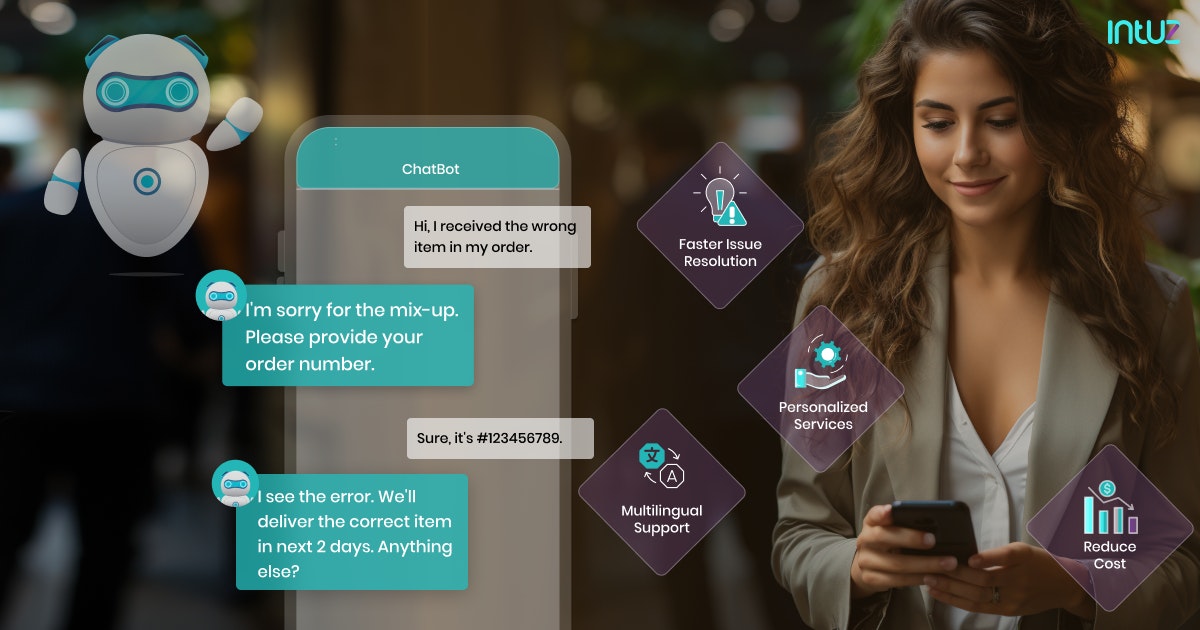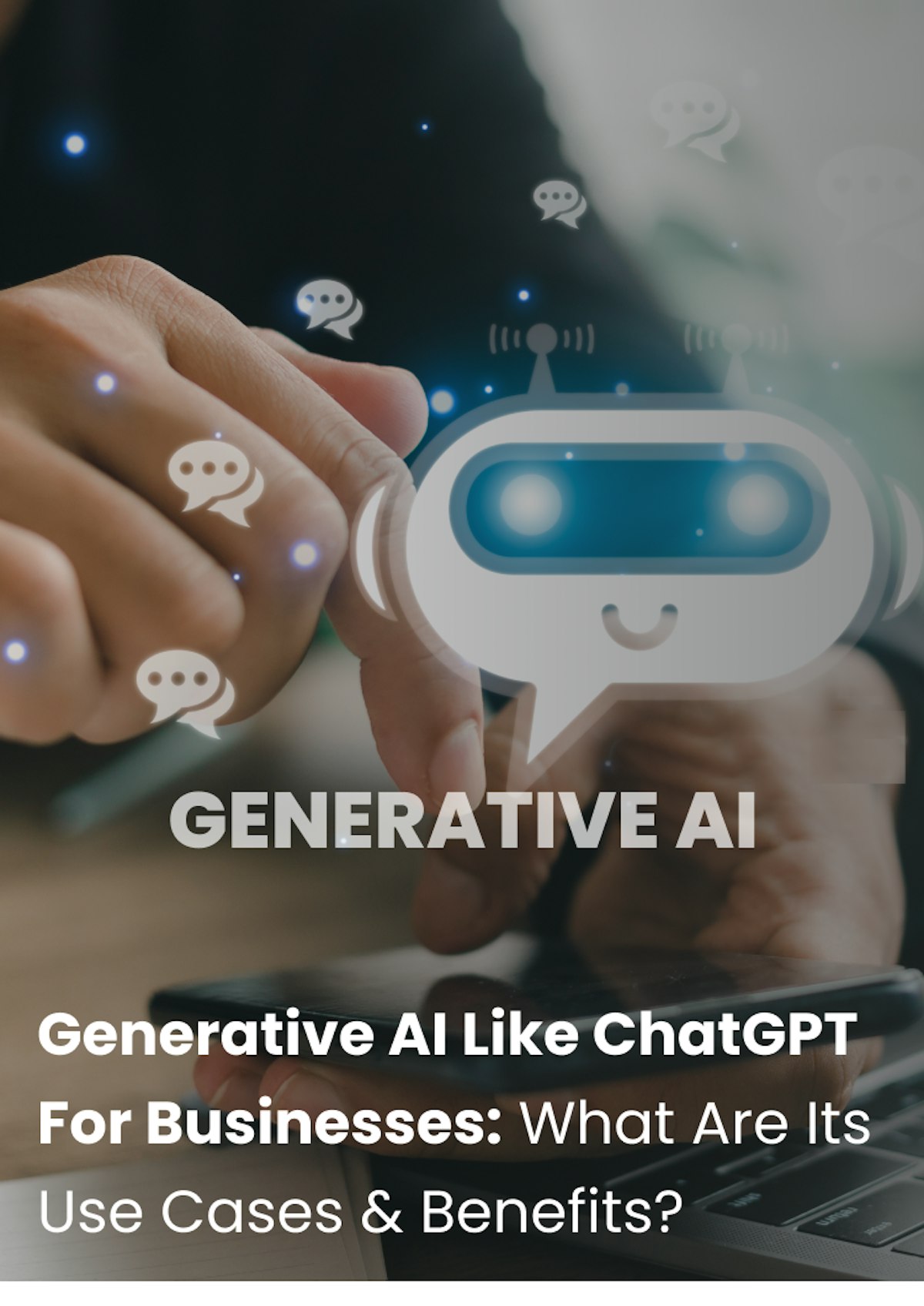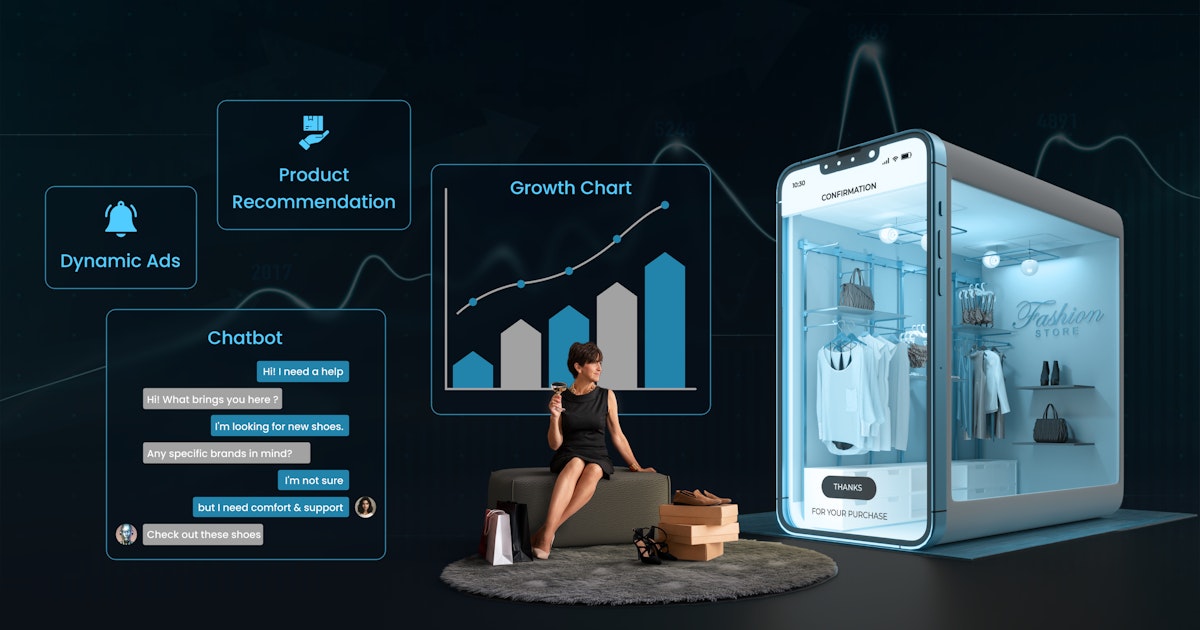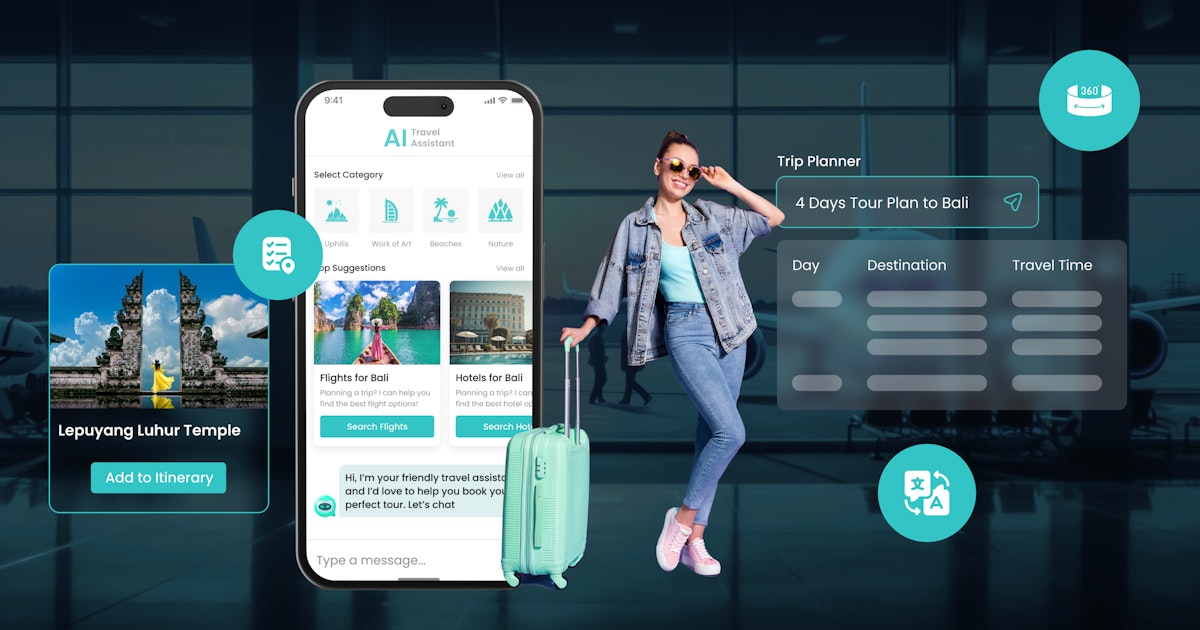Table of Content
A 2022 BCG survey reported that 95% of customer service leaders expect their customers to be serviced by a bot at some stage of the interaction journey within the next three years.
Interestingly, it has not even been 18 months, but we can see an increase in the adoption of Artificial Intelligence (AI), especially Generative AI, by businesses to deliver engaging experiences and generate lasting value.
The customer service tasks have long been working towards a collaborative AI-human approach, as it is difficult for a regular support team to manage repetitive customer questions and offer a personalized experience while being available 24/7.
Let us also not forget that hiring human agents costs between $2,600 and $3,400 per employee monthly.
What is AI for customer service?
Generative AI can learn from raw and/or unstructured datasets beyond just rule-based systems, allowing it to understand complex inquiries and generate more human-like, real-time conversational responses in seconds using conversational AI & Natural language understanding (NLU).
No wonder 38% of high-level executives want to invest in Generative AI to boost customer experience and retention initiatives. Whether you are a small business or a mid-sized firm, these advanced AI-powered tools dynamically interact with your customer base without human intervention.
Key takeaways
Enhance customer satisfaction by providing immediate, contextually relevant solutions using NLP, reducing the need for a large customer service team
Analyze customer data to offer personalized recommendations—minimize acquisition costs and boost revenues by aligning your business with customer interests
Enable more complex self-service options by understanding and responding to multi-part queries and changes in customer intent
Automatically categorize and route customer tickets to the appropriate agent or department—eliminate errors and speed up resolution times
Maintain an up-to-date knowledge base by learning from interactions with customers, thereby supporting both customers and agents with the latest information and guides
Study various customer communications to identify dissatisfaction to proactively address issues, improve products, and demonstrate responsiveness to customer feedback
Facilitate global customer engagement by translating queries and responses between multiple languages; expand market reach and customer loyalty
7 Real-World Use Cases of AI in Customer Service
Generative AI can transform customer service operations by automating instant answers to the most common customer queries, delivering a personalized experience, automating ticket routing, enabling customers to self-service, conducting sentiment analysis, auto-update knowledge base content, and multilingual customer support to streamline customer experiences. Let's dive deep into this:
1. Instantly answer the most common customer queries 24x7
Nearly 80% of customers believe speed, convenience, knowledgeable help, and friendly service are essential to a positive customer experience.
AI-powered chatbots can automate repetitive tasks and immediately answer common customer issues whenever and wherever people ask them. By quickly trawling through multiple databases for relevant answers, the technology can offer helpful solutions that go beyond “yes/no” responses.
Most importantly, it leverages Natural Language Processing (NLP) to produce results in human language that are contextually relevant rather than the same handful of pre-written responses.
For instance, if your customer is angry about a specific issue with product delivery, Generative AI can come up with a unique resolution rather than expressing generic sentiments like “We apologize for the inconvenience caused.”
It might say, “We are sorry your order #12345, scheduled for delivery on March 10th, has not arrived on time. We have looked into the delay and found that it was due to an unexpected shipping issue. To resolve this, we are expediting a replacement order to arrive by March 15th and offering a 10% discount on your next purchase for the inconvenience. Here is the tracking number for the replacement: XYZ.”
Such personalized relevant responses keep customers happy and help improve query resolution rates. Your business is also better equipped to maintain a smaller service team that focuses on more complex issues, thereby bringing down costs.
2. Offer personalized product and service recommendations
Generative AI collects and analyzes vast amounts of data about each customer. This data can include past purchases, browsing history, search queries, engagement with marketing content, and even customer service interactions.
Advanced Machine Learning (ML) algorithms process this data to identify patterns, preferences, and behaviors specific to each customer. Generative AI generates personalized service or product recommendations for each customer using the actionable insights gained.
For instance, if someone previously browsed for shoes on your website, you can initiate a pop-up chat and recommend your business' new collection.
By presenting customers with products or services that align with their interests and needs, you reduce customer acquisition costs by as much as 50% and increase revenues by 5%-15% because your suggestions are relevant.
3. Empower customers to self-serve and reach solutions faster
Did you know that 67% of customers prefer self-service over speaking to a customer service agent? While traditional AI meets that need to a large extent, it is typically limited to handling basic, single-step queries like “What is the ETA for my delivery?” or “Exchange XYZ product now.”
Generative AI, however, can parse more complex queries with multipart requests. It can analyze vocabulary and language usage to detect customer sentiment and respond appropriately and empathetically.
It can also detect a change in customer intent during the conversation (from making a payment to updating their contact information) and present an appropriate response to confirm that that is indeed what the customer wishes to do.
This frees customer support agents for the most complex problem resolutions, reducing response times and minimizing customer frustration.
Moreover, based on how the interaction went, Generative AI can study conversation transcripts and suggest ideal query answers that can help human agents close tickets more successfully.
4. Improve customer support efficiency with automatic ticket and information routing
Manual reassigning of customer queries is time-consuming, prone to human error, and often fails to meet the immediacy expected by modern customers.
This issue is particularly acute during high-demand events, where the volume of transfer requests can overwhelm customer service agents, further increasing the likelihood of mistakes and reducing the overall efficiency and security of the ticketing process.
Generative AI rapidly categorizes each customer ticket and intelligently routes it to the appropriate agent or department. This not only eliminates misdirected tickets but also enhances customer satisfaction.
Moreover, advanced AI technology can also pass on relevant notes about customer interaction, including any specific mood or intent detected in their chat.
This helps the human agent come to the table with a complete understanding of what the customer needs, avoiding the need for the customer to repeat themselves and bringing them closer to a solution.
5. Interactively share and update knowledge base content
Generative AI learns from customer queries to create an up-to-date knowledge repository for everything related to the product and the brand. Possible applications include:
- Proactively suggesting new FAQ sections and highlighting knowledge demand drivers based on search patterns from the transcripts of customer service conversations
- Turning successfully resolved cases into how-to guides so that agents can refer to them easily when a similar problem occurs
- Intuitively sorting and labeling the pieces based on how customers navigate the knowledge repository
- Fact-checking everything to ensure that the knowledge articles are up-to-date and accurate
- Generating new content based on unmet customer needs
Generative AI streamlines content creation, allowing customer service agents to dedicate more time to assisting customers while ensuring access to the most current information.
With a constantly updated knowledge base, customers can independently find the answers they need, fostering a positive self-service experience.
6. Conduct sentiment analysis to improve user experience
Generative AI can analyze social media conversations, emails, customer service chats, and online reviews to identify overt complaints and subtle signs of dissatisfaction with your products or services.
This strategic approach in customer support is critical, as it allows you to respond before that negative sentiment becomes a serious problem or starts impacting broader customer consciousness.
For instance, if you find many complaints about a specific product feature, you can modify or improve it or attempt to change its perception through direct communication.
By recognizing and rectifying the root cause of the problem, you reduce the likelihood of customers leaving for competitors. It also demonstrates that their feedback is taken seriously and can result in fundamental changes.
7. Provide multilingual customer support
Do not be surprised when we tell you that 29% of businesses lose customers due to a lack of multilingual support, and 71% of customers show greater loyalty to those offering support in their native language.
If your business operates in multiple countries or regions where different languages are spoken, using Generative AI to interpret foreign language queries makes sense.
The advanced AI technology can automatically translate customer queries received in various languages into the preferred language of your customer support team. Once resolved, the resolution could be translated back into the customer’s language.
This ensures a comfortable experience for global customers, removes the need to hire and train teams in other countries, and also opens up the scope for a broader customer base from which to gather feedback and buyer data.
Top Examples of Companies Using AI in Customer Service
1. Spotify
- Uses AI to power its "Spotify Assistant" chatbot
- Provides personalized music recommendations based on listening history
- Helps troubleshoot common account and playback issues
2. Sephora
- Implements an AI-powered Color IQ system
- Scans customers' skin to find the perfect foundation match
- The Virtual Artist feature uses AR to let customers try on makeup virtually
3. Domino's
- Employs "DOM" AI pizza ordering assistant
- Allows customers to place orders via voice on various platforms
- Uses predictive analytics to estimate order completion times
4. Bank of America
- Erica, their AI-powered virtual financial assistant
- Helps with account inquiries, bill payments, and financial advice
- Uses natural language processing to understand customer intent
5. Starbucks
- Starbucks Barista AI for mobile ordering
- Processes voice commands to customize and place orders
- Uses machine learning to improve personalized recommendations
6. H&M
- AI-powered chatbot for customer service and shopping assistance
- Provides personalized style advice based on customer preferences
- Uses image recognition to recommend items similar to uploaded photos
7. Airbnb
- AI-driven smart pricing tool for hosts
- Uses machine learning to optimize listing prices based on demand
- AI-powered translation service to facilitate communication between hosts and guests
Revitalize customer service approach with Generative AI
The possibilities of advanced AI technology in customer service are immense, and more applications are being developed daily. But the ones that truly stand out include:
- Detecting and responding to subtle emotional cues to cultivate meaningful connections with customers
- Adopting the company’s brand voice and even replicating the writing style of specific agents who previously interacted with the customer for consistency in communication
- Using synthetic voice production to create convincingly human bots that speak in a manner in line with the brand’s tone of voice
- Equipping AI tools like advanced bots and intelligent triage to discern the intent behind conversations and facilitating more effective guidance during live customer interactions
So, are you grappling with the challenges of providing round-the-clock customer support in a global market? Do you find it difficult to offer personalized and prompt service to a varied customer base?
Businesses that invest in AI are seeing a 250% average ROI. Avoid falling behind the curve.
Book a complimentary consultation today and receive a tailored Generative AI roadmap from Intuz experts to boost your customer service operations.






